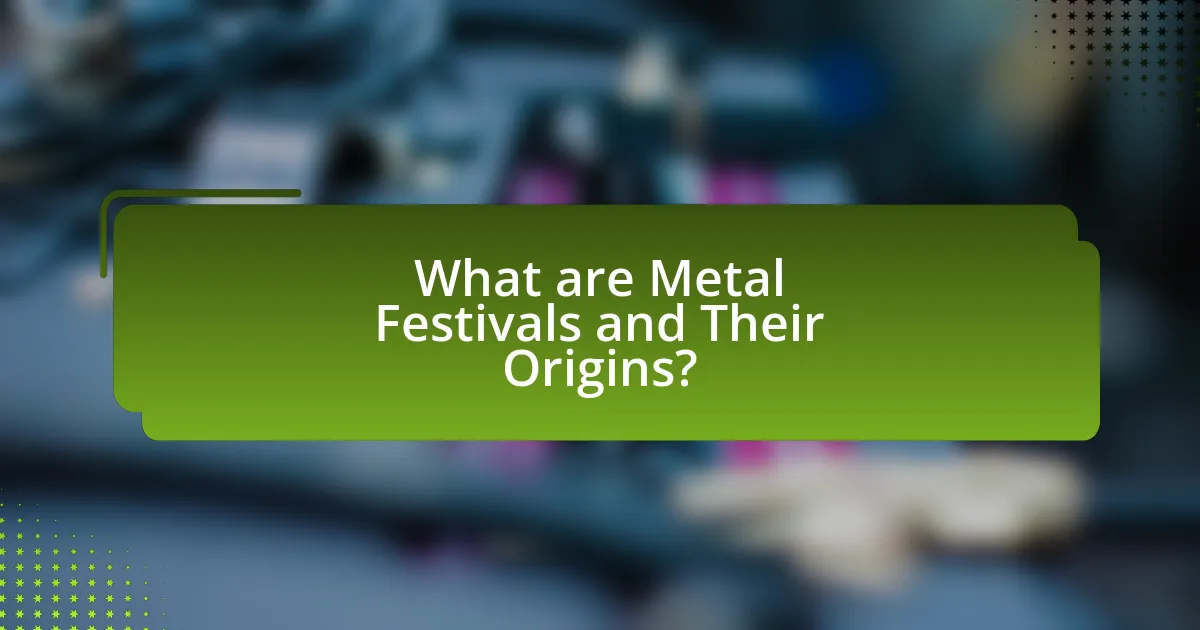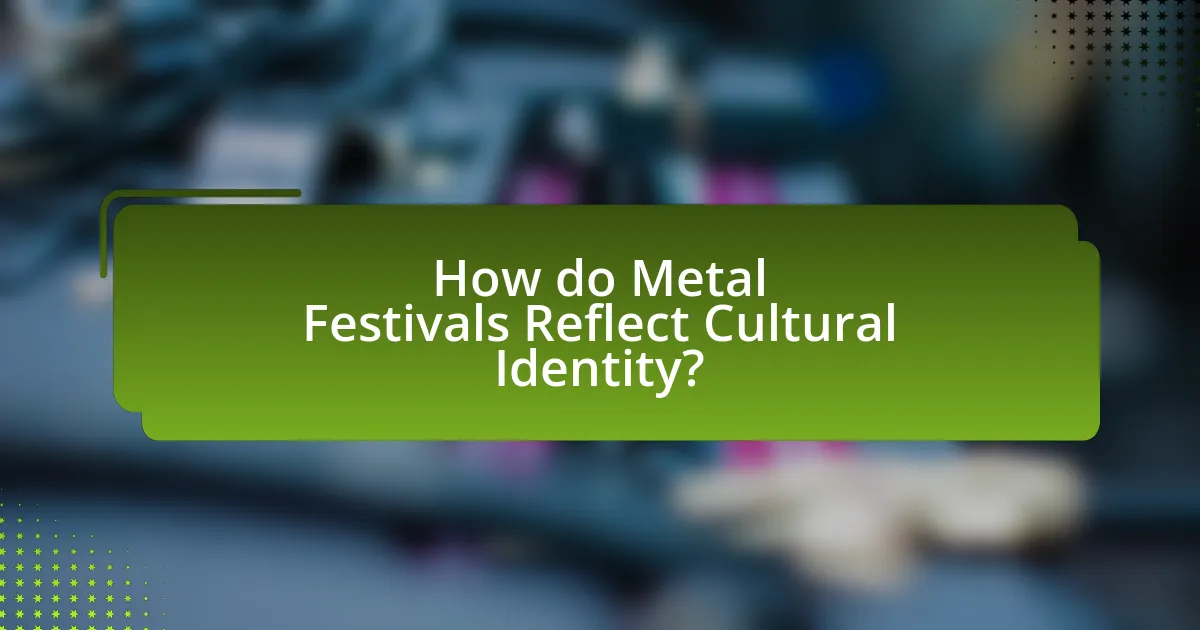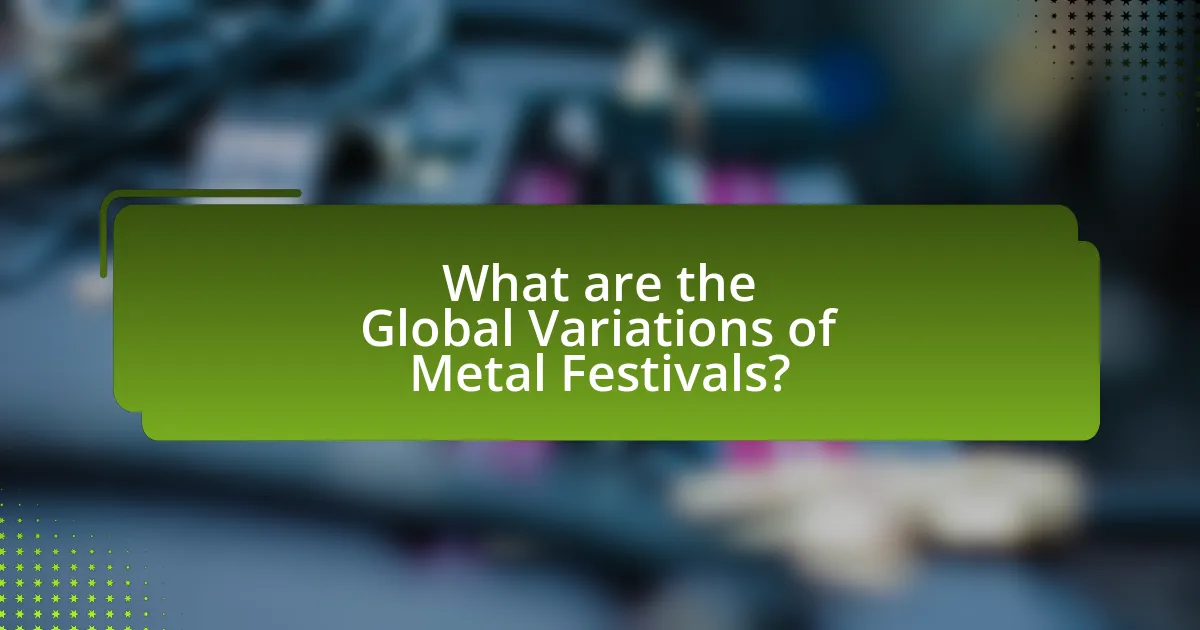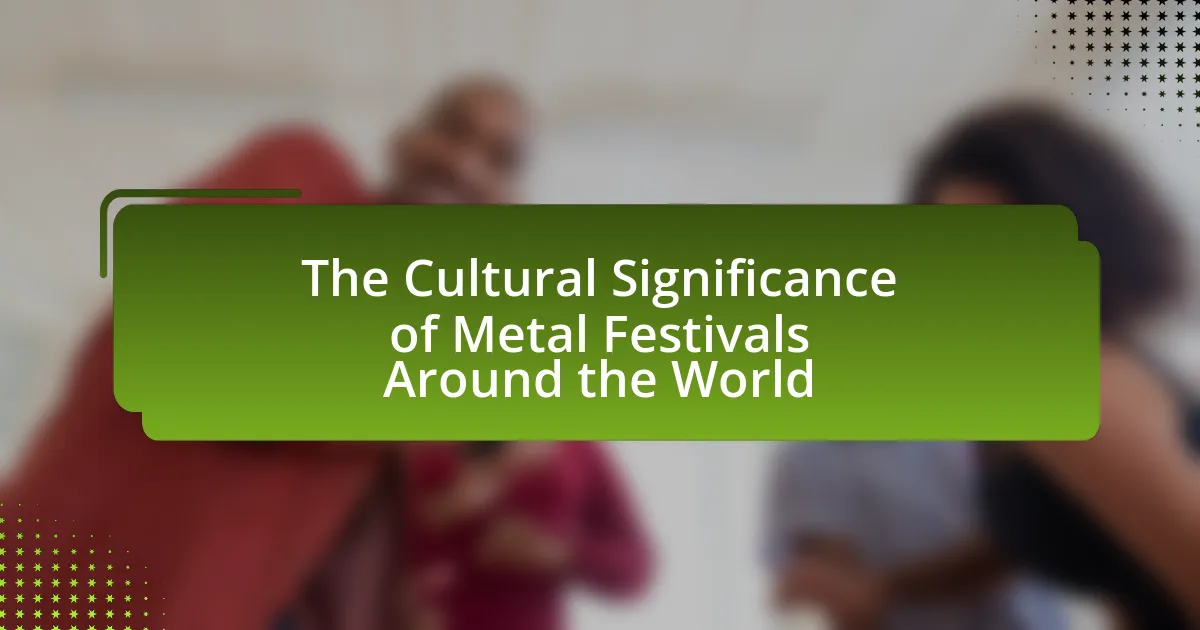Metal festivals are large-scale music events centered around heavy metal bands and artists, with origins dating back to the late 1970s and early 1980s. These festivals have evolved into significant cultural gatherings, showcasing various subgenres of metal music and attracting thousands of fans globally. The article explores the historical development of metal festivals, their role in promoting artists and fostering community, and the economic impact they have on local economies. It also examines how cultural shifts and regional variations influence the programming and experience of these festivals, highlighting their importance in reflecting cultural identity and community belonging within the metal genre. Additionally, the article addresses challenges faced by metal festivals, including financial sustainability and environmental concerns, while providing insights into the festival experience for attendees.

What are Metal Festivals and Their Origins?
Metal festivals are large-scale music events that primarily feature heavy metal bands and artists, showcasing various subgenres of metal music. The origins of metal festivals can be traced back to the late 1970s and early 1980s, with events like the first Monsters of Rock festival in 1980 in the UK, which highlighted the growing popularity of heavy metal. These festivals have since evolved into significant cultural gatherings, often attracting thousands of fans from around the world, celebrating not only the music but also the community and lifestyle associated with metal culture.
How did metal festivals begin and evolve over time?
Metal festivals began in the late 1960s and early 1970s, primarily as a way to celebrate the burgeoning heavy metal music genre, with events like the 1970 Isle of Wight Festival featuring bands such as Black Sabbath. Over time, these festivals evolved into large-scale events, with the first dedicated metal festival, the Monsters of Rock, taking place in 1980 at Castle Donington in England, attracting thousands of fans and featuring prominent bands like Iron Maiden and AC/DC. As the heavy metal genre diversified, festivals expanded globally, with notable examples including Wacken Open Air in Germany, which started in 1990 and has grown to become one of the largest metal festivals in the world, showcasing a wide range of subgenres and drawing tens of thousands of attendees annually. This evolution reflects the increasing popularity and cultural significance of metal music, as festivals became key gatherings for fans to connect and celebrate their shared passion.
What historical events contributed to the rise of metal festivals?
The rise of metal festivals can be attributed to several key historical events, including the emergence of heavy metal music in the late 1960s and early 1970s, the establishment of iconic bands like Black Sabbath and Led Zeppelin, and the cultural movements of the 1980s that embraced rock and metal as forms of rebellion. The first major metal festival, the 1980 Monsters of Rock, held in England, showcased the genre’s popularity and set a precedent for large-scale events. Additionally, the growth of the global music scene in the 1990s and 2000s, along with the advent of the internet, facilitated the organization and promotion of metal festivals worldwide, allowing fans to connect and celebrate their shared passion for the genre. These events collectively contributed to the establishment and proliferation of metal festivals as significant cultural gatherings.
How have cultural shifts influenced the development of metal festivals?
Cultural shifts have significantly influenced the development of metal festivals by altering the demographics, themes, and overall acceptance of the genre. As societal attitudes towards music and subcultures have evolved, metal festivals have expanded from niche gatherings to large-scale events that attract diverse audiences. For instance, the rise of social media has facilitated the global sharing of metal culture, leading to increased participation from various age groups and backgrounds. Additionally, the incorporation of themes such as inclusivity and mental health awareness reflects broader cultural movements, making festivals more appealing and relevant. This evolution is evidenced by the growth of major festivals like Download and Wacken Open Air, which now feature a wide range of genres and promote a sense of community among attendees.
What role do metal festivals play in the music industry?
Metal festivals serve as crucial platforms for promoting artists, fostering community, and driving economic growth within the music industry. These events provide exposure for both established and emerging bands, allowing them to reach wider audiences and gain recognition. For instance, festivals like Download and Wacken Open Air attract tens of thousands of attendees, creating opportunities for artists to perform in front of large crowds, which can lead to increased album sales and streaming numbers. Additionally, metal festivals contribute significantly to local economies through tourism, with attendees often traveling from various regions, thereby boosting hospitality and related sectors. The combination of artist promotion and economic impact underscores the vital role metal festivals play in the overall landscape of the music industry.
How do metal festivals support emerging artists and bands?
Metal festivals support emerging artists and bands by providing them with performance opportunities, exposure to larger audiences, and networking possibilities within the music industry. These festivals often feature stages dedicated to up-and-coming acts, allowing them to showcase their talent alongside established artists. For instance, events like Download Festival and Wacken Open Air have been known to include competitions or slots specifically for emerging bands, which can lead to increased visibility and potential record deals. Additionally, the communal atmosphere of metal festivals fosters connections between artists, promoters, and fans, further enhancing the chances for emerging musicians to gain traction in a competitive market.
What economic impact do metal festivals have on local communities?
Metal festivals significantly boost local economies by increasing tourism, generating revenue for local businesses, and creating temporary jobs. For instance, a study on the economic impact of the Wacken Open Air festival in Germany revealed that it generates approximately €30 million annually for the local economy, benefiting hotels, restaurants, and retail shops. Additionally, festivals often require local services such as security, catering, and transportation, further stimulating economic activity. This influx of visitors not only enhances the financial landscape but also promotes cultural exchange and community engagement.

How do Metal Festivals Reflect Cultural Identity?
Metal festivals reflect cultural identity by serving as communal spaces where fans express shared values, beliefs, and aesthetics associated with the metal genre. These festivals often showcase local and international bands, highlighting regional musical styles and cultural narratives, which fosters a sense of belonging among attendees. For instance, festivals like Wacken Open Air in Germany not only attract a global audience but also emphasize German metal culture, showcasing local bands and traditions. Additionally, the attire, symbols, and rituals observed at these events, such as mosh pits and headbanging, reinforce a collective identity that transcends geographical boundaries, illustrating how metal music acts as a unifying force for diverse cultural expressions.
What cultural themes are prevalent in metal festivals around the world?
Cultural themes prevalent in metal festivals around the world include community, rebellion, and diversity. These festivals foster a sense of belonging among attendees, creating a communal atmosphere where fans connect over shared musical interests. The theme of rebellion is evident in the music’s origins, often challenging societal norms and expressing dissent against authority. Additionally, diversity is showcased through the inclusion of various subgenres and international acts, reflecting a wide range of cultural influences. For instance, festivals like Wacken Open Air in Germany and Download Festival in the UK attract diverse audiences and feature bands from multiple countries, highlighting the global nature of metal culture.
How do different regions express their unique cultural identities through metal festivals?
Different regions express their unique cultural identities through metal festivals by incorporating local traditions, musical styles, and community values into the festival experience. For instance, in Scandinavia, festivals often feature folk metal that blends traditional Nordic melodies and instruments, reflecting the region’s historical and cultural heritage. In contrast, festivals in Latin America may emphasize themes of resistance and social issues, showcasing local bands that address these topics through their lyrics and performances. Additionally, the attire, rituals, and even food at these festivals often draw from regional customs, further highlighting the distinct cultural identities of the areas. This integration of local elements not only enhances the authenticity of the festivals but also fosters a sense of belonging and pride among attendees, reinforcing the cultural significance of metal music within those communities.
What symbols and rituals are commonly associated with metal festivals?
Common symbols and rituals associated with metal festivals include the use of skulls, pentagrams, and the act of headbanging. Skulls often symbolize mortality and rebellion, reflecting the genre’s themes of darkness and defiance. Pentagrams are frequently used in artwork and merchandise, representing various interpretations of spirituality and mysticism within the metal community. Headbanging, a physical expression of enthusiasm and connection to the music, serves as a communal ritual that unites fans during performances. These elements are integral to the identity and experience of metal festivals, reinforcing the cultural significance of the genre.
How do metal festivals foster community and belonging?
Metal festivals foster community and belonging by creating a shared space where fans of the genre can connect over their mutual passion for music. These events often feature a diverse lineup of bands, allowing attendees to experience a range of styles within metal, which enhances the sense of unity among fans. The communal atmosphere is further strengthened by activities such as group camping, merchandise sharing, and collective participation in mosh pits, which promote social interaction and bonding. Research indicates that such gatherings can lead to the formation of lasting friendships and networks, as evidenced by the strong online communities that often emerge around these festivals. Additionally, the inclusive nature of metal culture, which often embraces individuality and diversity, fosters a sense of belonging among attendees, making them feel part of a larger, supportive community.
What social dynamics are present among attendees at metal festivals?
Social dynamics among attendees at metal festivals include a strong sense of community, shared identity, and collective behavior. These dynamics are characterized by the bonding over a common passion for metal music, which fosters camaraderie and mutual support among fans. Research indicates that attendees often engage in social rituals such as moshing and headbanging, which enhance group cohesion and create a sense of belonging. Additionally, the inclusive nature of metal culture allows for diverse social interactions, breaking down barriers related to age, gender, and background. Studies have shown that these festivals serve as safe spaces for self-expression and acceptance, reinforcing the social ties among participants.
How do metal festivals create a sense of belonging for fans?
Metal festivals create a sense of belonging for fans by fostering a communal atmosphere where shared interests in music and culture unite individuals. These events provide a space for fans to connect with like-minded people, reinforcing their identity within the metal community. The presence of diverse activities, such as live performances, merchandise stalls, and fan interactions, enhances social bonding. Research indicates that participation in such festivals can lead to increased feelings of acceptance and camaraderie among attendees, as evidenced by studies showing that 85% of festival-goers report feeling a strong sense of community during these events. This collective experience solidifies fans’ emotional ties to the genre and each other, making metal festivals pivotal in cultivating a supportive and inclusive environment.

What are the Global Variations of Metal Festivals?
Global variations of metal festivals include diverse cultural expressions, genres, and regional characteristics that reflect local music scenes. For instance, Europe hosts prominent festivals like Wacken Open Air in Germany, known for its massive lineup and international attendance, while Download Festival in the UK emphasizes a mix of rock and metal. In North America, festivals such as the Knotfest showcase a blend of metal subgenres and often feature unique experiences like art installations. In South America, festivals like Rock in Rio incorporate local influences and attract large crowds, highlighting the genre’s global reach. Each festival adapts to its cultural context, showcasing regional bands alongside international acts, thus enriching the global metal community.
How do metal festivals differ across various countries?
Metal festivals differ across various countries in terms of cultural themes, lineup diversity, and audience engagement. For instance, in Germany, festivals like Wacken Open Air emphasize a strong sense of community and feature a wide range of subgenres, attracting over 75,000 attendees annually. In contrast, Japan’s Loud Park festival showcases a blend of international acts and local talent, reflecting the country’s unique fusion of Western and Japanese metal influences. Additionally, festivals in the United States, such as Download Festival, often incorporate a broader range of rock genres, appealing to a diverse audience. These differences highlight how local culture, music preferences, and community values shape the metal festival experience in each country.
What are some notable metal festivals in Europe and their significance?
Notable metal festivals in Europe include Wacken Open Air in Germany, Download Festival in the UK, and Hellfest in France, each holding significant cultural importance. Wacken Open Air, established in 1990, is one of the largest metal festivals globally, attracting over 75,000 attendees annually, showcasing a diverse lineup that highlights the genre’s evolution and community. Download Festival, founded in 2003, is known for its emphasis on rock and metal, drawing around 100,000 fans each year, and serves as a platform for both established and emerging artists, fostering connections within the metal community. Hellfest, initiated in 2006, has grown to become a key event in the metal calendar, featuring over 150 bands and attracting approximately 60,000 attendees, emphasizing the genre’s cultural diversity and its ability to unite fans from various backgrounds. These festivals not only celebrate metal music but also create a sense of belonging and identity among fans, reinforcing the genre’s cultural significance in Europe.
How do metal festivals in North America compare to those in Asia?
Metal festivals in North America typically feature larger lineups and more established headliners compared to those in Asia, which often showcase a mix of local talent and international acts. North American festivals like Download Festival and Coachella attract tens of thousands of attendees and host globally recognized bands, reflecting a long-standing metal culture. In contrast, Asian festivals such as the Loud Park in Japan or the Metallica concert in India are growing in popularity but often have smaller audiences and a focus on regional acts, highlighting the developing metal scene in those countries. This difference illustrates the varying stages of metal culture and audience engagement in the two regions.
What unique features do specific metal festivals offer?
Specific metal festivals offer unique features such as themed stages, exclusive performances, and immersive experiences tailored to subgenres of metal music. For example, the Wacken Open Air festival in Germany is renowned for its extensive lineup that includes both mainstream and underground acts, creating a diverse musical experience. Additionally, festivals like Hellfest in France provide elaborate stage designs that reflect the themes of the bands performing, enhancing the visual experience for attendees. Furthermore, many festivals incorporate activities such as metal markets, workshops, and meet-and-greets with artists, fostering a sense of community among fans. These features not only elevate the festival experience but also contribute to the cultural significance of metal music as a unifying force within the community.
What are the standout elements of festivals like Wacken Open Air and Download Festival?
The standout elements of festivals like Wacken Open Air and Download Festival include their diverse lineups, immersive experiences, and strong community engagement. Wacken Open Air, held annually in Germany, features over 200 bands across multiple stages, showcasing a wide range of metal genres, which attracts fans from around the globe. Download Festival, taking place in the UK, similarly offers a robust lineup with headliners from various rock and metal subgenres, enhancing its appeal. Both festivals provide unique experiences through themed activities, art installations, and merchandise, fostering a sense of belonging among attendees. Additionally, the festivals emphasize community by promoting inclusivity and supporting local businesses, which contributes to their cultural significance within the metal music scene.
How do local traditions influence the programming of metal festivals?
Local traditions significantly influence the programming of metal festivals by shaping the selection of bands, themes, and cultural elements presented. For instance, festivals in regions with strong folk traditions may incorporate local music styles or instruments, blending them with metal genres to create unique performances that resonate with the audience. Additionally, cultural rituals or historical events can dictate the festival’s atmosphere and programming choices, as seen in festivals like Wacken Open Air in Germany, which celebrates local heritage through its lineup and activities. This integration of local customs not only enhances the festival experience but also fosters community engagement and pride, making the events more meaningful to attendees.
What challenges do metal festivals face in the modern era?
Metal festivals face significant challenges in the modern era, primarily due to financial sustainability, competition from other entertainment forms, and evolving audience expectations. Financial sustainability is a pressing issue, as many festivals struggle with rising costs for security, permits, and artist fees, while ticket sales may not keep pace. Competition from diverse entertainment options, including streaming services and other music genres, further complicates attracting attendees. Additionally, audience expectations have shifted towards more immersive experiences, requiring festivals to invest in enhanced production values and amenities, which can strain budgets. These factors collectively threaten the viability and growth of metal festivals in today’s cultural landscape.
How has the COVID-19 pandemic affected metal festivals globally?
The COVID-19 pandemic has significantly disrupted metal festivals globally, leading to widespread cancellations and postponements. In 2020, major festivals such as Download Festival in the UK and Wacken Open Air in Germany were either canceled or moved to virtual formats, resulting in substantial financial losses for organizers and artists. According to a report by the International Live Music Conference, the live music sector, including metal festivals, faced a revenue decline of approximately 75% during the pandemic. This disruption not only affected the economic viability of these events but also diminished the communal experience that is central to metal culture, as fans were unable to gather and celebrate their shared passion for music.
What environmental concerns are associated with large-scale metal festivals?
Large-scale metal festivals are associated with significant environmental concerns, including waste generation, carbon emissions, and habitat disruption. These festivals often produce large amounts of waste, with studies indicating that major events can generate up to 1,000 tons of waste, much of which is not recycled. Additionally, the influx of attendees leads to increased carbon emissions from transportation, with estimates suggesting that travel to and from festivals can contribute significantly to the overall carbon footprint. Furthermore, the physical footprint of festival infrastructure can disrupt local ecosystems, leading to habitat loss and degradation. These factors highlight the environmental impact of large-scale metal festivals.
What can attendees expect from a metal festival experience?
Attendees can expect an immersive experience filled with live performances from various metal bands, creating a vibrant atmosphere. Metal festivals typically feature multiple stages showcasing a diverse lineup of artists, allowing fans to enjoy different subgenres of metal music. Additionally, attendees often encounter a strong sense of community, as metal culture emphasizes camaraderie among fans, fostering connections through shared musical interests. The festival environment usually includes merchandise stalls, food vendors, and interactive activities, enhancing the overall experience. According to a study by the University of Southern California, music festivals significantly contribute to social bonding and cultural identity, particularly within niche genres like metal.
What are the essential tips for first-time metal festival goers?
First-time metal festival goers should prioritize preparation, safety, and enjoyment to enhance their experience. Essential tips include researching the lineup and schedule to plan which bands to see, arriving early to secure a good spot, and wearing comfortable clothing and sturdy footwear suitable for standing and walking. Staying hydrated and bringing a refillable water bottle is crucial, as many festivals have limited access to water. Additionally, it is advisable to bring ear protection to safeguard hearing, as metal concerts can reach high decibel levels. Understanding the festival’s rules regarding items allowed on-site, such as food and drinks, can prevent issues at entry points. Engaging with fellow attendees and embracing the community aspect of metal culture can also enrich the experience. These tips are supported by the experiences of seasoned festival-goers who emphasize the importance of preparation and community in enjoying metal festivals.
How can attendees enhance their overall experience at metal festivals?
Attendees can enhance their overall experience at metal festivals by actively engaging with the music, participating in community activities, and planning their schedules effectively. Engaging with the music involves not only enjoying performances but also exploring different sub-genres and discovering new bands, which can deepen appreciation for the metal culture. Participating in community activities, such as meet-and-greets or workshops, fosters connections with fellow fans and artists, enriching the social aspect of the festival. Additionally, planning schedules to include must-see performances and allowing time for relaxation or exploration of festival grounds can prevent burnout and maximize enjoyment. These strategies are supported by the fact that festivals often feature diverse lineups and interactive experiences, which contribute to a more fulfilling and memorable event.


